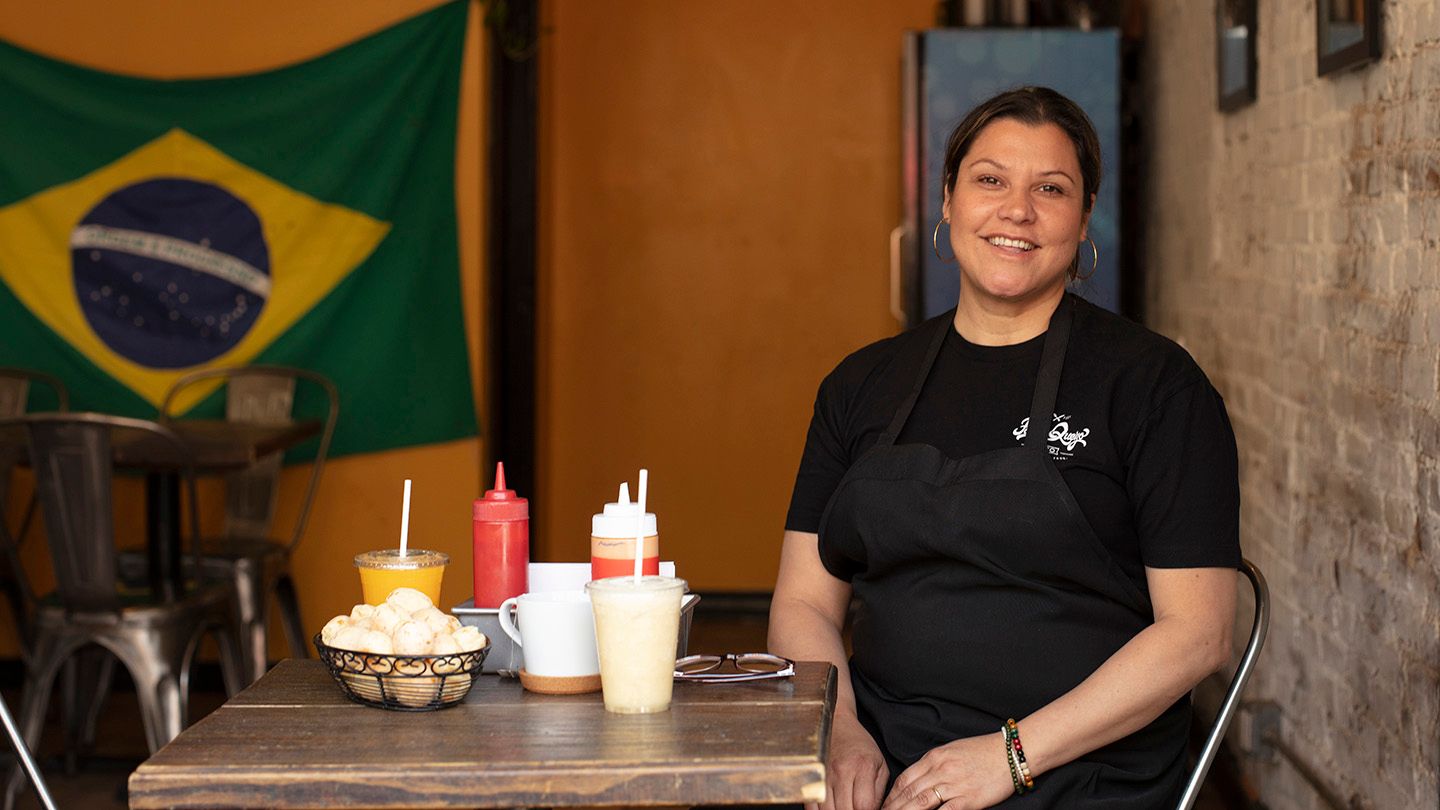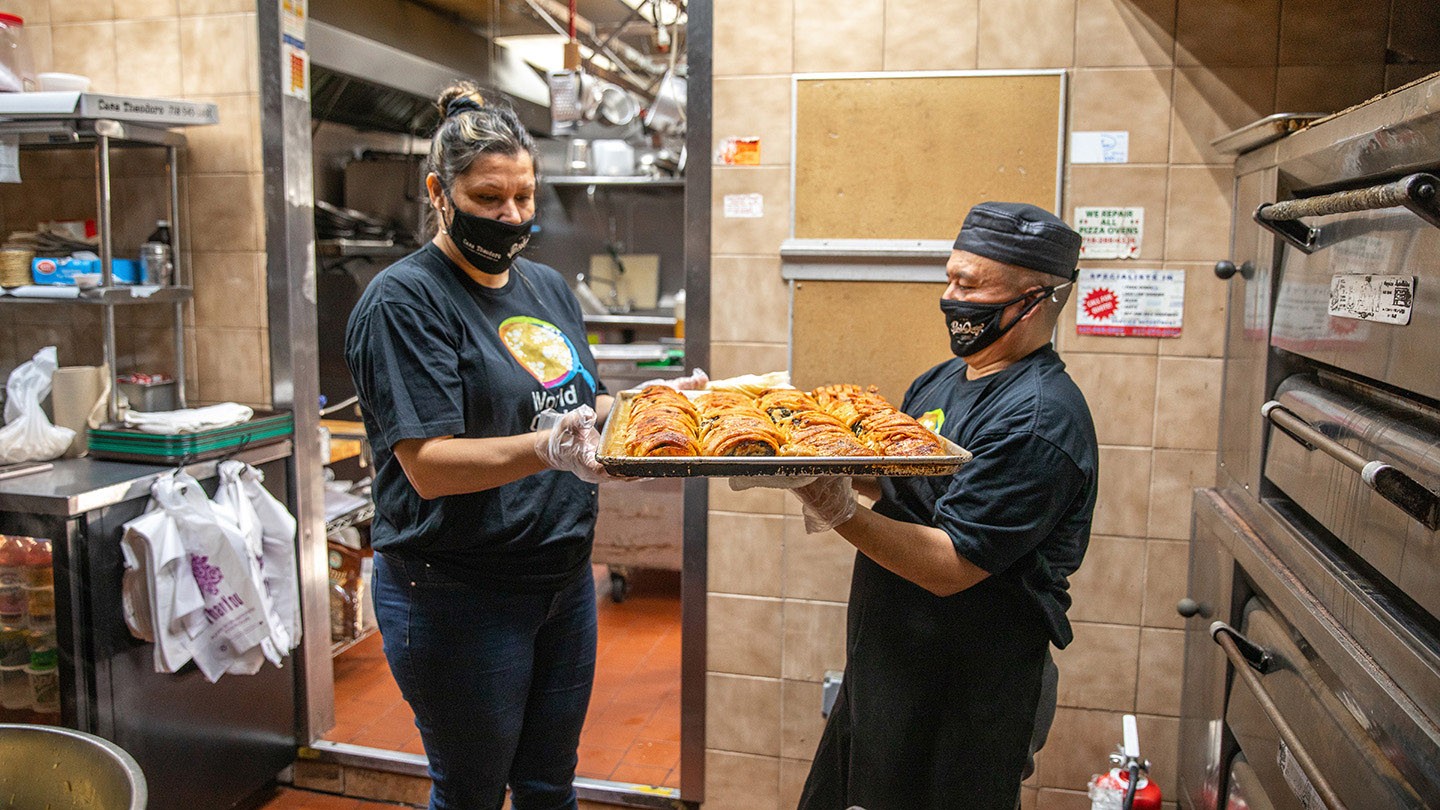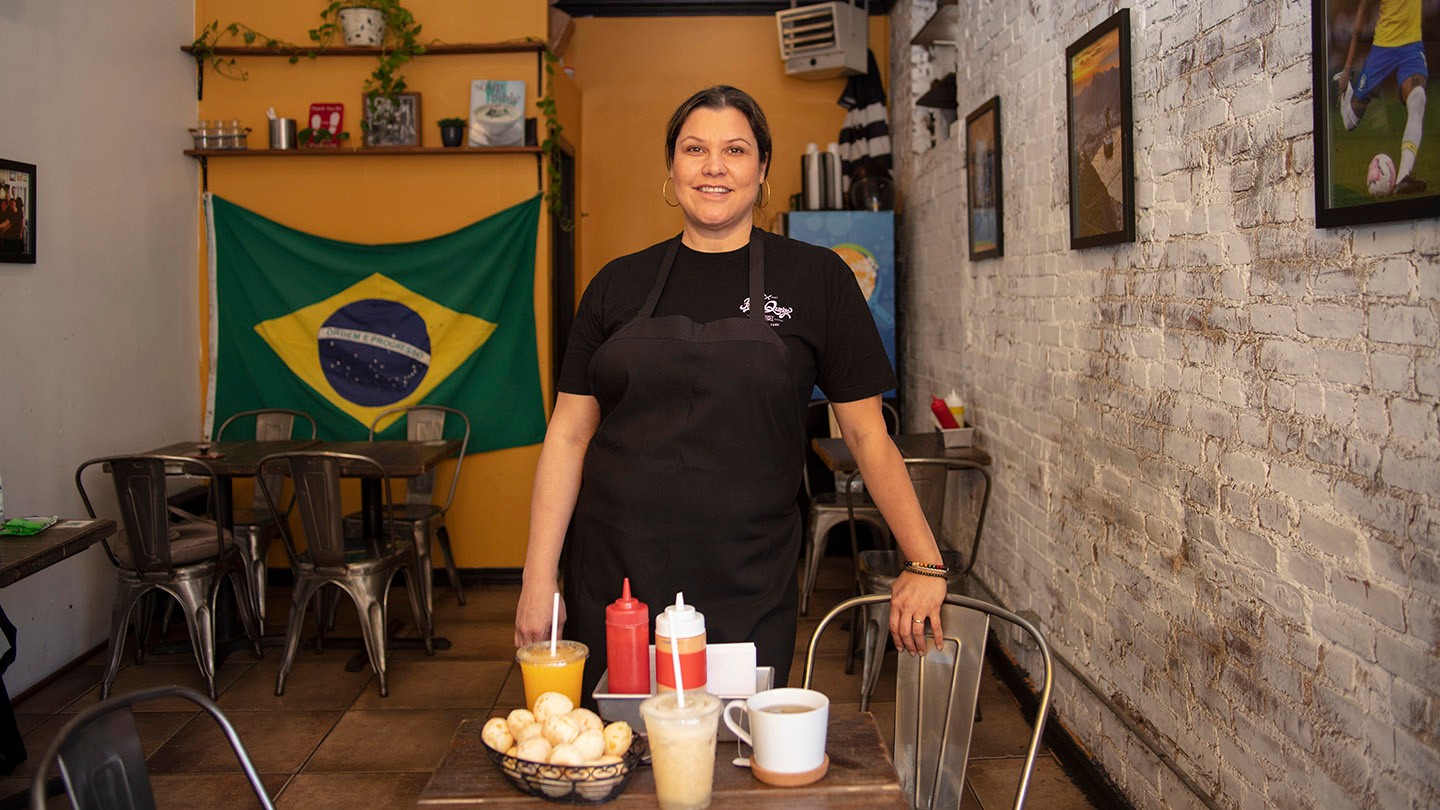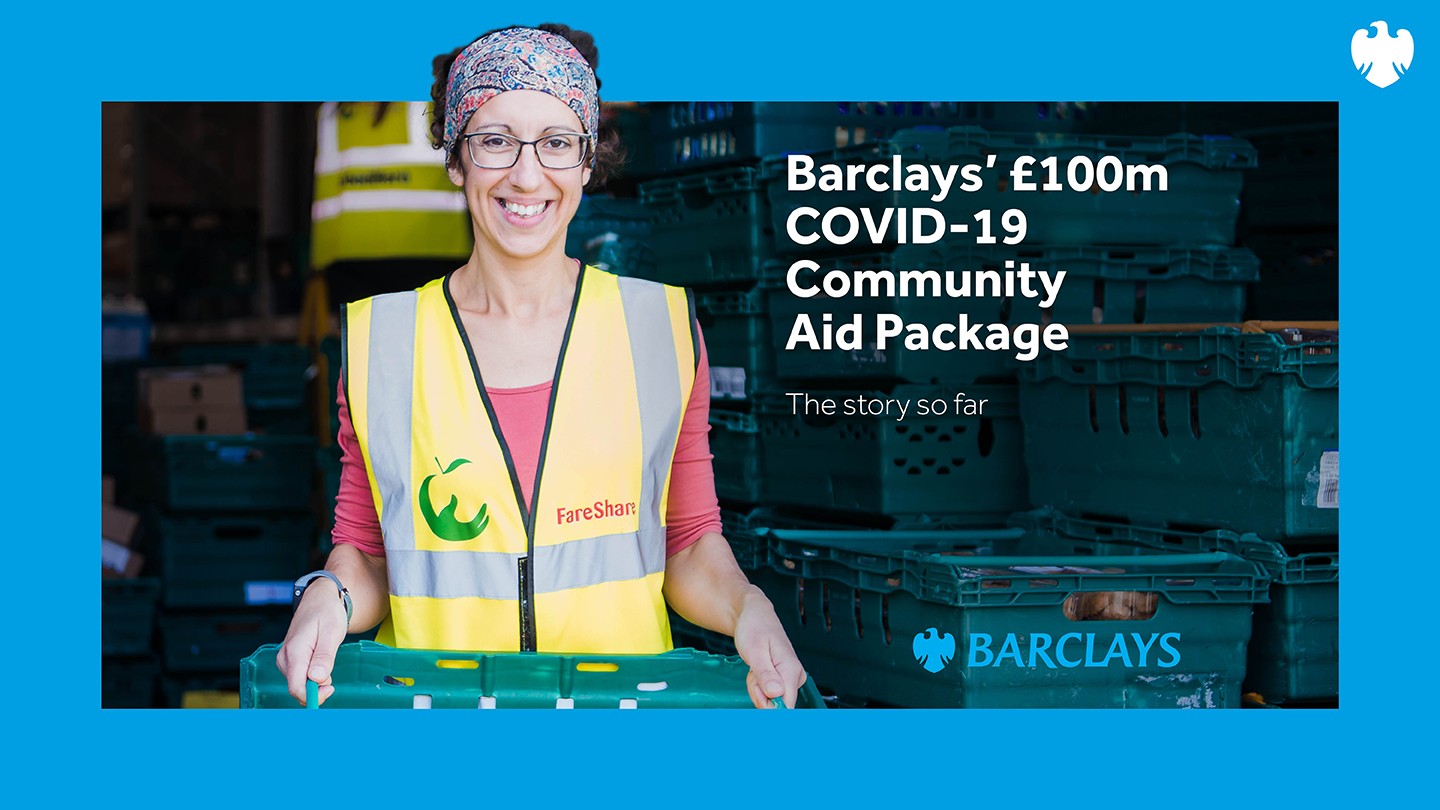
World Central Kitchen: "A nourishing, hot plate of food is a sign that someone cares”
When the pandemic hit the US, World Central Kitchen brought together restaurants struggling to survive with those in urgent need of nutritious meals. We talk to New York restaurant owner Karina Guimaraes and the disaster relief non-profit about the how Barclays’ COVID-19 Community Aid Package supported their vital work.
Springtime in New York City has historically been the time that Pao de Queijo, a Brazilian restaurant in Astoria, Queens, begins earning the profits to see them through the next winter. But when COVID-19 hit the city in March 2020, owner Karina Guimaraes started to fear for the future of her business.
“I feel like crying when I think about it,” says Guimaraes, who emigrated from Sao Paulo, Brazil, to the US in 1999, and has been running Pao de Queijo since 2007. “The restaurant almost shut down.”
With the pandemic threatening Guimaraes’s business, along with the jobs and livelihoods of five longstanding staff members she considers “family”, support from food relief organisation World Central Kitchen came not a moment too soon.
In the past, the Washington DC-based non-profit has used its network of restaurants and chefs to set up ‘central kitchens’ in places impacted by crises to provide food to those in need.
But the pandemic has called for a different approach.
To help keep restaurants afloat and help workers and drivers earn a living while giving meals to those in dire need, World Central Kitchen launched the #ChefsForAmerica programme. The initiative has a dual purpose: to work directly with the hard-hit restaurant industry while also tackling the rise in hunger.
Given that restaurants are the second largest employer in the US and it’s expected that the pandemic has led to more than 50 million people struggling to access food, the need on both sides is huge.

Barclays’ donation has helped World Central Kitchen to deliver more than 75,000 restaurant-prepared meals since March 2020.
We didn’t do anything new – we're just connecting the dots in a way that hasn't been done before.
VP of Development, World Central Kitchen
Connecting the dots
“We couldn’t hop on a plane and set up kitchens in the 350-plus cities where we activated, so very early on in March 2020, we started working with our expanding network to respond to the pandemic,” explains Erin Gore, VP of Development at the non-profit.
“It was a really beautiful and symbiotic relationship that helped World Central Kitchen to meet the crisis on two fronts: paying local restaurants to continue cooking for people in vulnerable communities, and getting nourishing meals to those who need them most. We didn’t do anything new – we're just connecting the dots in a way that hasn't been done before."
World Central Kitchen works with participating restaurants and delivery apps to send free meals directly to those who need them the most – including frontline medical staff, children and families who usually rely on school meal programmes, people experiencing homelessness, and older people in care homes.
Gore describes this as a “pivotal shift” in the approach and breadth of the relief organisation, adding: “We're very nimble and entrepreneurial when it comes to getting meals to communities.”
The non-profit’s response has been supported by Barclays’ £100m COVID-19 Community Aid Package – designed to offer critical support to vulnerable people impacted by the social and economic crisis caused by the pandemic.
Barclays’ donation has bolstered the non-profit’s support in New Jersey and New York, enabling the team to deliver more than 75,000 restaurant-prepared meals since March 2020. In addition, the partnership has helped 80 local restaurants and community organisations to stay open and their restaurant workers to continue working. Gore says: “We appreciate the great work we have done together and our shared commitment with Barclays to helping the residents of New York City and New Jersey get through these tough times.”
Even with the crucial support that the scheme offered Pao de Queijo, Guimaraes recalls thinking that keeping her restaurant open was “going to be a lot of work”. “But all my staff agreed to try. And I thought, if somehow it doesn’t work out for us money-wise, it doesn’t matter – because at least we’ll be helping people in need.”

With support from World Central Kitchen, Guimaraes was able to keep Pao de Queijo open and her staff employed through the pandemic.
We focus on a nourishing, hot plate of food because we think and hope it will be a sign that someone cares.
Director of Communications Strategy, World Central Kitchen
A sign that someone cares
Lisa Abrego, Director of Communications Strategy, shared a first-hand experience of how meaningful the organisation’s work can be. "A woman who received one of our meals said, ‘You can tell this was made with love’.
“At the end of the day, that's part of our core mission – and why we do the things we do, in the way we do them. We focus on a nourishing, hot plate of food because we think and hope it will be a sign that someone cares.”
For Guimaraes, serving up to 4,000 meals per week at Pao de Queijo is worth it to “see people happy”. She says: “Going to the sites, and hearing people say how much they love your food is very rewarding.”
Over the last decade, World Central Kitchen has been providing meals for communities affected by disasters – including the devastating impact of 2017’s Hurricane Maria in Puerto Rico, the wildfires across California last year and most recently the explosion in Beirut. Founded by José Andrés, the organisation wanted to move away from the dry meal bags often used in food relief, infusing the non-profit with a chef’s passion for good cooking.
Explaining the ethos of the non-profit, Gore says: “When there's a medical emergency, you call the doctors. When a bridge collapses, you call the architects and engineers. But for so long during food crises, the true food experts – the chefs – have not had a seat at the table.”
A powerful partnership
The World Central Kitchen team is passionate about the support they can provide to hard-hit communities – but also realises that collaboration is essential because “the problem is bigger than any one organisation”, says Abrego. This is where working closely with others helps the non-profit to expand its reach and deliver the most effective relief possible.
This can involve speaking to other non-profits to avoid duplicating efforts or combining resources and expertise with those of organisations like Barclays.
“When we can blend our knowledge and talent with that of the private sector, that is our star moment at World Central Kitchen,” says Gore. “It's the best of both worlds coming together to further a shared mission.”
Carrying out this mission can also empower those supported to pay it forward. Reflecting on the challenges of the last year, Guimaraes says: “People have helped me a lot since I came to this country – sometimes people I don’t even know. I want to return that help if I can. So whatever I can do, I will do.”
Barclays’ £100m COVID-19 Community Aid Package: the story so far

To date, Barclays has supported more than 290 charities around the world delivering vital COVID-19 relief. Read about the positive difference these charity partnerships are making to communities impacted by the pandemic in a newly published COVID-19 Community Aid Package Impact Report.